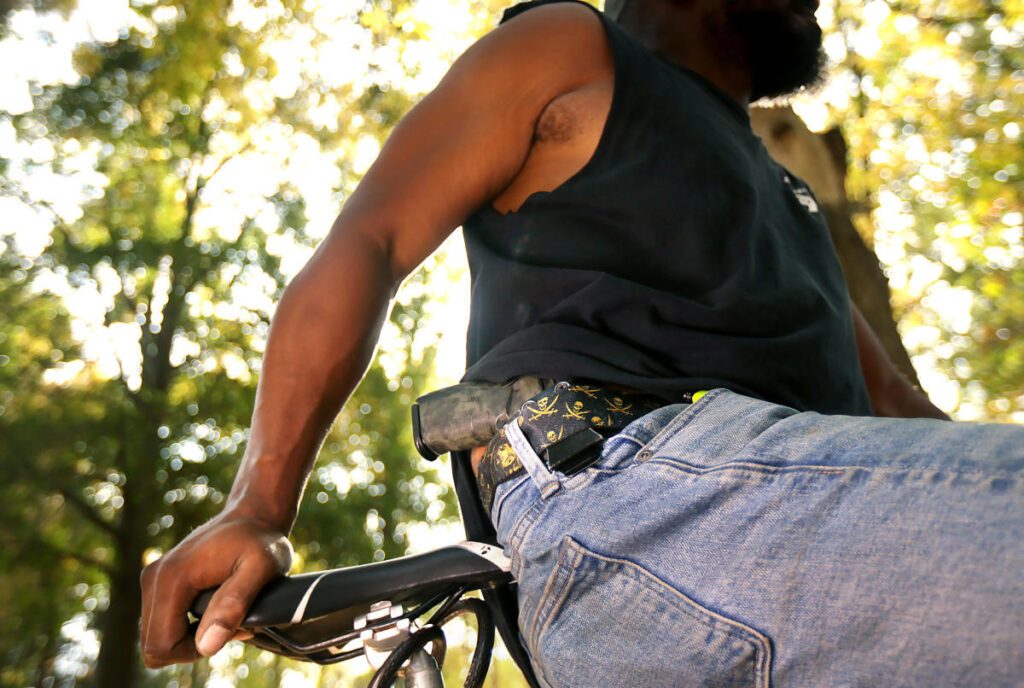On July 25, 2019, a 37-year-old man found himself in a life-altering situation while waiting in line at a Virginia Beach 7-Eleven around 2 a.m. As he focused on his strawberry-melon Big Gulp, he suddenly noticed a red dot on his cup, drawing his attention to two hooded men brandishing guns directed at him and the store clerk. Despite the tense scenario, the man remained composed, feeling for his own gun concealed under his T-shirt. When the situation escalated with one robber attempting to steal cash from the register, he reacted instinctively by drawing his 9 mm firearm. The shooting left one suspect wounded and the other dead, forever changing the trajectory of his life amidst the complexities of self-defense laws in Virginia.
Virginia law allows gun owners the right to defend themselves, but this right comes with strict conditions that many individuals often misunderstand. Legal experts argue that the use of deadly force is only justifiable under specific circumstances. Norfolk Commonwealth’s Attorney Ramin Fatehi cautions that while an individual might believe they have acted rightly in self-defense, the legal implications can be severe if a court deems the force used was not appropriate. The burden of proof lies with the defendant, who must demonstrate that any reasonable person in their situation would have feared for their life or that of another. This process is evaluated through the lens of an outside observer, and factors like a defendant’s role in instigating the conflict can heavily influence the outcome of a case.
Self-defense claims in Virginia are scrutinized rigorously, and the state’s “model jury” instructions emphasize that defendants must retreat when they are “with fault,” or face potential consequences. Furthermore, individuals cannot use deadly force solely to protect property, which is a common misconception among many gun owners. The importance of the immediacy of threat is also highlighted; if a threat has passed or is no longer present, the justification for using deadly force diminishes. A notable case exemplifying this legal landscape involved Calvin Anthony Durham Jr., who, after instigating a fight, ended up being fatally shot after disengaging. The shooter, who believed to be acting in self-defense, was found guilty of manslaughter, underscoring the complexities surrounding self-defense cases in Virginia.
The emotional and psychological toll of experiencing such traumatic events can extend long after the incident. Despite being cleared of legal charges, the 7-Eleven shooter grappled with trauma and guilt for the five years following the incident. He shared his experience anonymously, reflecting on the stigma attached to being involved in a shooting, even in self-defense. The mental anguish resulting from the event affected various aspects of his life, including his career and personal relationships. His inability to return to a sense of normalcy raises critical questions about the challenges individuals face when they become involved in violent incidents, regardless of legal outcomes.
The aftermath of a self-defense shooting often leads to significant emotional distress for the shooter, impacting their daily life and mental health. Defense attorney Mario Lorello noted that the stress associated with murder trials is intense, creating a psychological burden even for clients who are ultimately acquitted. The trauma experienced can result in long-lasting effects, as individuals navigate their altered sense of identity and societal perception following such incidents. The distinctions between lawful self-defense and actions perceived as excessive force can lead to profound ramifications for both the individual involved and the broader community.
Despite the turmoil following the shooting, the man expressed a firm belief in his actions, maintaining that he legally protected himself and upholding his right to bear arms. While he does not regret defending himself, the experience has undoubtedly shaped his perspective on relationships and everyday interactions. The stigma, along with the labels of ‘hero’ or ‘killer’ that people bestowed upon him, fed into his struggle to reintegrate into society. Over time, he has found a degree of stability, yet the shadow of that fateful night remains, demonstrating that the repercussions of such encounters extend far beyond the immediate legal consequences.
Ultimately, the complexities surrounding self-defense laws in Virginia highlight the delicate balance between the right to bear arms and the legal accountability that follows. The case exemplifies the importance of understanding the legal framework governing self-defense and the emotional toll these high-stakes encounters can enforce on individuals. While the pursuit of personal safety is a fundamental right, the ramifications of using deadly force are profound, warranting thoughtful consideration from all gun owners. The experience of the Virginia Beach shooter serves as a reminder of the psychological and legal intricacies that arise when an individual is faced with a life-threatening situation, signaling a call for greater awareness and understanding in the discourse around self-defense and gun ownership.

